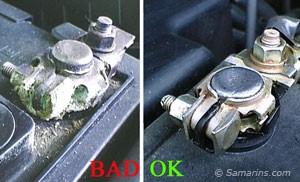
As temperatures rise in Mukwonago, we’ve seen more and more customers coming in with failing batteries. One common culprit: Corrosion.
Corrosion on your car battery can reflect normal wear and tear on your vehicle as the battery ages, but it can become worse with high temperatures in the summer months. And while it can be okay to see a small amount of corrosion at the terminal, large buildups can signal a problem.
Causes of Battery Corrosion
Most often, corrosion occurs on the battery terminals. The sulfuric compound inside car batteries emits hydrogen gas, which can be trapped under the hood and corrode the terminals.
Small leaks or loose connections to lead to corrosion. If you notice a crack in the battery or acid leaking on the outside, you might have a serious problem. Bring your vehicle in right away for an inspection and to replace the battery.
Symptoms and Warning Signs
As corrosion occurs, you’ll start to see white, green, or blue material building up on the terminals. And while small amounts may be harmless, if the build-up continues to grow it can interfere with moving the charge from the battery to the engine.
The electric charge inside the battery needs to be transferred to the engine in order to run your vehicle. If enough corrosion has built up on the terminals, less current will travel through the terminals. You’ll notice a loss of power and may even require a jump start to get going.
Problems with Corrosion
The most common effect of a corroded car battery is not being able to start the vehicle. But even if you’re willing to put up with frequent jump starts, latent problems can manifest due to related problems. Accessories like the radio or cabin lights may fail without enough power.
If the problem persists, the vehicle’s on-board computer may show issues or fail to operate. The on-board computer receives important information from the many sensors in your vehicle to keep the car running, alert to potential issues, and keep you safe. Ignoring issues may put the safety of you and your vehicle at risk.
What should you do?
If you notice corrosion, clean it off right away. You can clean battery terminals yourself with a wire brush and solution of baking soda and water, or bring your vehicle into our shop – our ASE certified technicians will remove the corrosion and thoroughly inspect the battery and all related or effected components.
Corrosion could be a sign of a more serious problem. Don’t ignore the warning – schedule an appointment or drop in anytime to have your battery tested, inspected, and identify problems early to avoid hassle and expensive repairs down the road.

 MENU
MENU